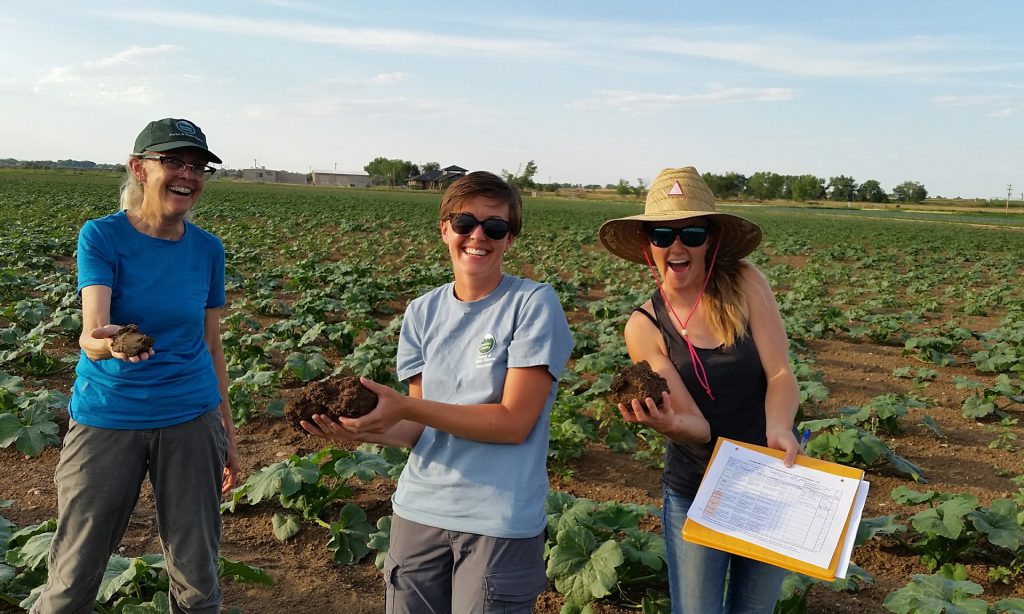The Soil Revolution: Part 1 highlighted the efforts of Boulder County Parks & Open Space (BCPOS) to monitor soil health on county-owned agricultural properties. The 2017 season engaged more farmers, ranchers, and volunteers, created more insights, and led to a greater understanding of the principles of soil health.
Five Principles of Soil Health
Soil Armor: Reduces wind and water erosion, decreases water evaporation, moderates soil temperature, reduces the impact of raindrops, suppresses weed growth, and provides habitat for soil organisms.
Minimize Soil Disturbance: Soil disturbance is divided into biological, chemical, and physical processes. Over time, minimizing soil disturbance will help rebuild soil aggregates, pore spaces, soil glue, and soil organic matter.
Plant Diversity: Crop rotations provide more biodiversity benefitting the soil food web. Crop rotations can be designed to include cool and warm season broadleaves and grasses, high and low water users, fibrous roots and tap roots, as well as legumes and non-legumes, to name a few.
Continual Living Plant Root: A living plant root, either from a commodity crop, cover crop, or forage crop provides exudates to feed the soil food web. Cover crops can fill in the dormant periods between annual cash crops.
Livestock Integration: Balances soil carbon and nitrogen ratios by converting high carbon forages to low carbon organic material, thus reducing nutrient export from the soil. Integrating livestock also promotes rangeland and pasture management in combination with cover crop grazing.
Volunteers Complete Assessments
Eighteen volunteers honed their soil health assessment skills on eight different agricultural properties in 2017. Properties ranged from no-till alfalfa fields, to conventionally farmed grain crops, to dryland wheat/fallow systems, to organic vegetables, to soil-building cover crops. On eight beautiful summer nights, BCPOS staff, Natural Resources Conservation Service (NRCS) staff, and volunteers completed the Colorado NRCS Soil Health Cropland Resource Concern Assessment card that assesses physical and biological conditions of the soil. BCPOS and NRCS staff also collected soil samples from eight properties in September for lab analysis at Cornell University for the Comprehensive Assessment of Soil Health (CASH) and at Ward Laboratories for the Haney Test. Combined results of the field score, CASH and Haney tests are found in the table below.
The analyses results are shared with the agricultural tenants who lease open space properties. These results help guide management decisions about how to best steward this vital resource, while maintaining economic and environmental sustainability.
Climate Change and Soil
Climate change and carbon sequestration are at the forefront of many minds. To investigate exactly how much carbon is in agricultural soils, BCPOS partnered with the NRCS to complete quantitative data collection of full soil characterization and dynamic soil properties on seven properties. Site selection emphasized locally important farmland managed with common farming practices. National protocol was used by the sampling team consisting of NRCS soil scientists and BCPOS staff. This data set is the first full characterization data produced by USDA-NRCS for the Soil Survey of Boulder County Area (CO643). Trenches dug two meters deep allowed the team to collect soil samples to evaluate key soil properties including total soil organic carbon, soil organic carbon changes by depth, cropping rotation, and by land use, particulate organic matter, CO2 mineralization rate, aggregate stability, texture, bulk density, pH, cation exchange capacity and available water capacity. These data will be available upon completion of the analysis by the Kellogg Soil Survey Laboratory in Lincoln, NE in 2018. Data will be published at the following website: ncsslabdatamart.sc.egov.usda.gov
In addition to monitoring soil health on agricultural open space, BCPOS co-hosted (along with NRCS, Colorado State University Extension, the Longmont and Boulder Valley Conservation Districts, and the City of Boulder) two soil health conferences in 2017. “The Soil Revolution” and “The Soil Revolution: Digging Deeper” (www.SoilRev.org) brought together over 20 speakers including farmers from Boulder County, Eastern Colorado, the San Luis Valley, New Mexico, and Nebraska. Soil health experts from the NRCS, Colorado State University, and the private sector also inspired the audiences with their hopeful messages about improving soil health to increase farm resiliency, both environmentally and economically. Over 400 people attended the conferences.
The Agricultural Resources Division at BCPOS recognizes the time and talent of our partner agencies in Boulder County and the volunteers dedicated to our programs. We would not exist without our 65 tenant farmers and ranchers—our partners in conservation. Their dedication to Boulder County agriculture is unmatched. Thank you!
| Score Type | Property 1 |
Property 2 |
Property 3 |
Property 4 |
Property 5 |
Property 6 |
Property 7 |
Property 8 |
Property 9 |
|---|---|---|---|---|---|---|---|---|---|
| Field Score | 2.6 | 1.8 | 1.7 | 2.2 | 1.5 | 1.3 | 1.6 | 1.8 | N/A |
| CASH Score | 65 | 49 | N/A | 64 | 51 | 36 | 42 | 48 | 52 |
| Haney Score | 8.13 | 11.09 | N/A | 10.33 | 12.37 | 6.20 | 4.83 | 5.66 | 7.66 |
The Field Score ranges from one to three; three being highest or best.
The CASH Score ranges from one to 100; higher scores are better.
The Haney Score ranges from one to 50; seven or higher is preferred.

